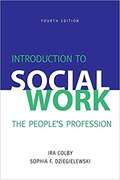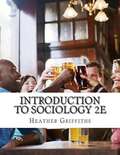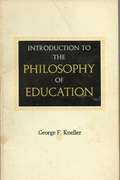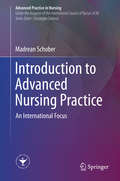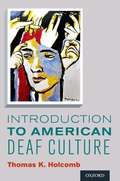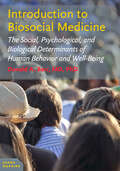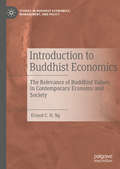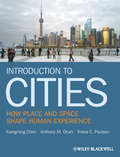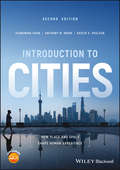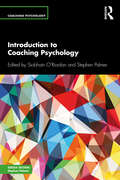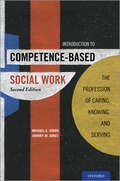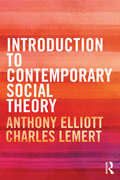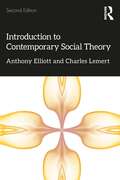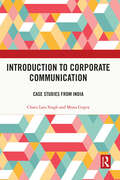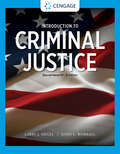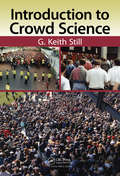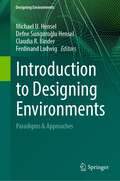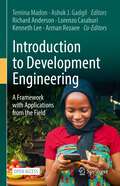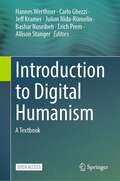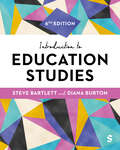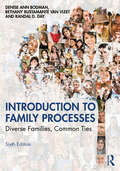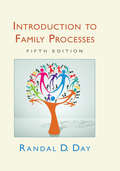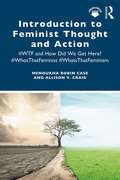- Table View
- List View
Introduction To Social Work: The People's Profession
by Ira Colby Sophia F. DziegielewskiThere are certain questions that all students considering social work ask. Who are social workers? What is it that social workers do? How is the social work profession changing? What does it take to become a social worker? Ira Colby and Sophia Dziegielewski bring their decades of experience in social work practice and education to answer these questions. This engaging text gives readers a practical guide to the many ways in which social workers effect change in their communities and the world. The authors offer an overview and history of the profession; introduce readers to the practice of social work at the micro, mezzo, and macro level; and finally look closely at the many settings and populations that social workers work with. While realistically portraying the pressures and obstacles that social workers face, Colby and Dziegielewski communicate their own passion for social work.
Introduction To Sociology (Second Edition)
by Heather Griffiths Nathan Keirns Eric Strayer Susan Cody-Rydzewski Gail Scaramuzzo Tommy Saddler Sally Vyain Jeff Bry Faye JonesIntroduction to Sociology 2e adheres to the scope and sequence of a typical, one-semester introductory sociology course. It offers comprehensive coverage of core concepts, foundational scholars, and emerging theories, which are supported by a wealth of engaging learning materials. The textbook presents detailed section reviews with rich questions, discussions that help students apply their knowledge, and features that draw learners into the discipline in meaningful ways. The second edition retains the book’s conceptual organization, aligning to most courses, and has been significantly updated to reflect the latest research and provide examples most relevant to today’s students. In order to help instructors transition to the revised version, the 2e changes are described within the preface.
Introduction To The Philosophy Of Education
by E. KnellerThe purpose of this book is to outline those elements of philosophy that are relevant to a proper understanding of education and the task of teaching. Much of the content comes from a text that I edited, entitled Foundations of Education (Wiley, 1963). I have rewritten and in places enlarged the original, especially the sections on existentialism and logical analysis, which I have assigned to a separate chapter.
Introduction to Advanced Nursing Practice: An International Focus (Advanced Practice in Nursing)
by Madrean SchoberPrepared under the auspices of the International Council of Nurses (ICN), this first volume provides a comprehensive overview of the rapidly emerging field of advanced nursing practice. It addresses central issues in the role and practice development that are fundamental to defining and differentiating the nature of this field. Topics include defining the role, role characteristics, scope of practice, education, regulation and research. Obstacles to and facilitators of that role are addressed and include ethical questions arising in the context of practice development. With an international focus, this volume examines international developments in the field, as reflected in country-specific case studies and examples. It offers a valuable resource for advanced practice nurses, educators and administrators at healthcare institutions.
Introduction to American Deaf Culture (Professional Perspectives on Deafness: Evidence and Applications)
by Thomas K. HolcombIntroduction to American Deaf Culture is the only comprehensive textbook that provides a broad, yet in-depth, exploration of how Deaf people are best understood from a cultural perspective, with coverage of topics such as how culture is defined, how the concept of culture can be applied to the Deaf experience, and how Deaf culture has evolved over the years. Among the issues included are an analysis of various segments of the Deaf community, Deaf cultural norms, the tension between the Deaf and disabled communities, Deaf art and literature (both written English and ASL forms), the solutions being offered by the Deaf community for effective living as Deaf individuals, and an analysis of the universality of the Deaf experience, including the enculturation process that many Deaf people undergo as they develop healthy identities. <p><p> As a member of a multigenerational Deaf family with a lifetime of experience living bi-culturally among Deaf and hearing people, author Thomas K. Holcomb enhances the text with engaging stories interwoven throughout. In addition to being used in college-level courses, this book can also help parents and educators of Deaf children understand the world of Deaf culture. It offers a beautiful introduction to the ways Deaf people effectively manage their lives in a world full of people who can hear.
Introduction to Biosocial Medicine: The Social, Psychological, and Biological Determinants of Human Behavior and Well-Being
by Donald A. BarrUnderstanding human behavior is essential if medical students and doctors are to provide more effective health care.While 40 percent of premature deaths in the United States can be attributed to such dangerous behaviors as smoking, overeating, inactivity, and drug or alcohol use, medical education has generally failed to address how these behaviors are influenced by social forces. This new textbook from Dr. Donald A. Barr was designed in response to the growing recognition that physicians need to understand the biosocial sciences behind human behavior in order to be effective practitioners. Introduction to Biosocial Medicine explains the determinants of human behavior and the overwhelming impact of behavior on health. Drawing on both recent and historical research, the book combines the study of the biology of humans with the social and psychological aspects of human behavior. Dr. Barr, a sociologist as well as physician, illustrates how the biology of neurons, the intricacies of the human mind, and the power of broad social forces all influence individual perceptions and responses. Addressing the enormous potential of interventions from medical and public health professionals to alter these patterns of human behavior over time, Introduction to Biosocial Medicine brings necessary depth and perspective to medical training and education.
Introduction to Buddhist Economics: The Relevance of Buddhist Values in Contemporary Economy and Society (Studies in Buddhist Economics, Management, and Policy)
by Ernest C. NgLiving in a market-driven economy where short-term profit and economic growth appear to be the ultimate goal, this book explores how Buddhist teachings could bridge the divide between our spiritual and material needs and reconcile the tension between doing good for social interest and doing well for financial success. This book serves as a pioneering effort to systematically introduce Buddhist Economics as an interdisciplinary subject to audience with limited background in either Buddhism or economics. It elaborates some core concepts in Buddhist teachings, their relevance to economics, and means of achieving sustainability for individuals, society and the environment with the cultivation of ethical living and well-being. Through scholarly research from relevant fields including Buddhist studies, economics, behavioral finance, cognitive science, and psychology, this book illustrates the relevance of Buddhist values in the contemporary economy and society, as well as the efficacy of Buddhist perspectives on decision-making in daily life.
Introduction to Cities
by Xiang Ming Chen Krista E. Paulsen Anthony M. OrumA complete introduction to the history, evolution, and future of the modern city, this book covers a wide range of theory, including the significance of space and place, to provide a balanced account of why cities are an essential part of the global human experience. Covers a wide range of theoretical approaches to the city, from the historical to the cutting edgeEmphasizes the important themes of space and placeOffers a balanced account of cities and offers extensive coverage including urban inequality, environment and sustainability, and methods for studying the city Takes a global approach, with examples from Berlin and Chicago to Shanghai and MumbaiIncludes a range of pedagogical features such as a substantial glossary of key terms, critical thinking questions, suggestions for further reading and a range of innovative textboxes which follow the themes of Exploring Further, Studying the City and Making the City Better Extensively illustrated with maps, charts, tables, and over 80 photographsAccompanied by a comprehensive student companion site featuring a list of relevant journals, a guide to useful web resources, and an annotated documentary film guide, alongside a useful instructor companion site with further examples, case studies, and discussion and essay questions; instructors will find a link to the instructor website on the student website at www.wiley.com/go/cities
Introduction to Cities: How Place and Space Shape Human Experience
by Krista E. Paulsen Anthony M. Orum Xiangming ChenThe revised and updated second edition of Introduction to Cities explores why cities are such a vital part of the human experience and how they shape our everyday lives. Written in engaging and accessible terms, Introduction to Cities examines the study of cities through two central concepts: that cities are places, where people live, form communities, and establish their own identities, and that they are spaces, such as the inner city and the suburb, that offer a way to configure and shape the material world and natural environment. Introduction to Cities covers the theory of cities from an historical perspective right through to the most recent theoretical developments. The authors offer a balanced account of life in cities and explore both positive and negative themes. In addition, the text takes a global approach, with examples ranging from Berlin and Chicago to Shanghai and Mumbai. The book is extensively illustrated with updated maps, charts, tables, and photographs. This new edition also includes a new section on urban planning as well as new chapters on cities as contested spaces, exploring power and politics in an urban context. It contains; information on the status of poor and marginalized groups and the impact of neoliberal policies; material on gender and sexuality; and presents a greater range of geographies with more attention to European, Latin American, and African cities. Revised and updated, Introduction to Cities provides a complete introduction to the history, evolution, and future of our modern cities.
Introduction to Coaching Psychology (Coaching Psychology)
by Siobhain O’RiordanThis collection featuring chapters by leading international practitioners will offer an introduction to coaching psychology for those new to it, including students, trainees, psychologists, and coaches. Introduction to Coaching Psychology covers key topics, including the background and development of coaching psychology, the coach-coachee relationship, coaching psychology approaches and models, and themes such as assessment, contracting, and the setup in coaching psychology practice. Applications in coaching psychology are considered, including a look at particular coaching psychology specialisms and interventions, as well as discussions about working in organisations, working with young people, and life and personal coaching. Professional practice issues, such as boundaries and best practice, and coaching and diversity, are also explored. Furthermore, a review of coaching psychology research is presented. The book also offers a rich collection of case studies to illustrate the practice of coaching psychology in a real-world setting and concludes with a consideration of the future of the field. This timely and accessible book will be essential reading for anyone new to the field, as well as coaches, psychologists, and counsellors interested in the theory, research, and practice of coaching psychology.
Introduction to Competence-Based Social Work: The Profession of Caring, Knowing, and Serving
by Michael E. Sherr and Johnny M. JonesSocial work is rooted in the values of service, social justice, and strong interpersonal relationships, but as the profession evolves, so must the approach to education. Michael E. Sherr and Johnny M. Jones have created an introductory textbook written for the future of social work. The second edition integrates the knowledge of practice, policy, research, HBSE, and field work with the skills and practice behaviors necessary for students to become fully competent social workers by the time they graduate. Students are introduced to social work through a "Why We Do, What We Do" model that emphasizes how and why social workers commit to their careers. 41 case vignettes, 16 of which are new, engage students and present a clear picture of the profession to help them become invested in enhancing and restoring the well-being of individuals, groups, and communities.
Introduction to Computational Cultural Psychology
by Yair NeumanHuman psychology is deeply rooted in the culture in which people live. Introduction to Computational Cultural Psychology introduces a revolutionary approach for studying cultural psychology. Drawing on novel computational tools and in-depth case studies, Professor Yair Neuman offers thought-provoking answers to questions such as: how are thought and language deeply related? How can computers help us to understand different cultures? How can computers assist military intelligence in identifying vengeful intentions? And how is our concept of 'love' rooted in our basic embodied experience? Written by a leading interdisciplinary researcher this book is a "tour-de-force" which will be of interest to a variety of researchers, students and practitioners in psychology as well as an interdisciplinary audience with an interest in the intricate web weaved between the human psyche and its cultural context.
Introduction to Contemporary Social Theory
by Charles Lemert Anthony ElliottIn this comprehensive, stylish and accessible introduction to contemporary social theory, Anthony Elliott and Charles Lemert examine the major theoretical traditions from the Frankfurt School to globalization and beyond. When first published, the book’s wide range set new standards for introductory textbooks – social theorists discussed include Theodor Adorno, Herbert Marcuse, Michel Foucault, Jacques Lacan, Jacques Derrida, Anthony Giddens, Pierre Bourdieu, Julia Kristeva, Jurgen Habermas, Judith Butler, Slavoj Zizek, Manuel Castells, Ulrich Beck, Zygmunt Bauman, Giorgio Agamben and Manuel De Landa. Extensively developed to take into account significant recent developments in American social theory, the book offers chapters on American pragmatism, structural functionalism, ethnomethodology, black feminist thought and world-systems theory. American traditions of social theory are brought powerfully to life in treatments of intellectuals ranging from William James to Robert K. Merton, David Riesman to Randall Collins, and Patricia Hill Collins to Saskia Sassen. Introduction to Contemporary Social Theory combines lively exposition and clarity with reflective social critique and original insights, and is a superb textbook with which to navigate the twists and turns of contemporary social theory as taught in the disciplines of sociology, politics, history, cultural studies and many more.
Introduction to Contemporary Social Theory
by Charles Lemert Anthony ElliottIn this comprehensive and clear introduction to contemporary social theory, Anthony Elliott and Charles Lemert explore the major theoretical traditions from the Frankfurt School to the digital revolution and beyond. Fully revised and updated, this second edition has been expanded to consider the most recent developments in social theory, including a new chapter on the digital revolution and the increasingly significant impact of technological developments (such as artificial intelligence, machine learning and robotics) on society, culture and politics. Introduction to Contemporary Social Theory provides the reader with a superb overview of key developments in social theory, including the Frankfurt School, American pragmatism, structuralism, post-structuralism, feminism, globalization and world-systems theory. In doing so, the textbook explores the ideas of a wide range of social theorists, including Theodor Adorno, Herbert Marcuse, Talcott Parsons, Erving Goffman, Harold Garfinkel, Michel Foucault, Jacques Lacan, Jacques Derrida, C. Wright Mills, Anthony Giddens, Pierre Bourdieu, Julia Kristeva, Jürgen Habermas, Judith Butler, Slavoj Žižek, Manuel Castells, Cornel West, Immanuel Wallerstein and Zygmunt Bauman. This textbook provides stylish exposition with powerful social critique and original insights. It will be indispensable to students and academics alike.
Introduction to Corporate Communication: Case Studies from India
by Charu Lata Singh Mona GuptaThis book examines the evolution of corporate communication in the recent past in the context of the rapidly changing contemporary business environment in India. Using several case studies, it illustrates the growing need for small and large businesses to recognize and form a direct connection with their stakeholders and further explains the effective ways through which specific business requirements are realized by communication managers. The book explores the greater dependency and function of multiple media strategies and their challenges. It also offers various theoretical and practical insights into the successful integration of diverse communication and marketing strategies like employee communication, investor relations, corporate social responsibility and philanthropy, branding, crisis management, and corporate ethics and governance, among others. Lucid and comprehensive, this book will be an essential read for students and scholars of corporate communications, business management, media and communication studies, public relations, and marketing, as well as communication and marketing practitioners.
Introduction to Criminal Justice (Mindtap Course List Series)
by Larry J. Siegel John L. WorrallTake a close look at the intriguing concepts, policies and processes at work in today's criminal justice system with Siegel/Worrall's best-selling INTRODUCTION TO CRIMINAL JUSTICE, 17E. Known for trusted, solidly researched content, this reader-friendly presentation examines the impact of recent events, such as the coronavirus pandemic, racial unrest and publicized shootings, on contemporary crime and the criminal justice system. <p><p>This edition is packed with provocative, high-profile examples and the latest developments and trends—from new crime-countering technology to efforts in criminal justice reform. Inviting narratives, vivid illustrations, fascinating cases and special topic features delve into the intricate workings behind policing, courts and correctional systems. You examine issues such as stereotyping, recent scandals and the implications of court decisions and career options as you gain a better understanding of the challenges and opportunities within criminal justice.
Introduction to Crowd Science
by G Keith StillThis well-grounded and practical guide highlights the underlying causes of crowd disasters and mass fatalities-giving readers insight into the root causes of crowd-related accidents. It presents a clearer understanding of crowd dynamics and provides the reader with fundamental modeling techniques to plan and manage and improve crowd safety in places of public assembly. The book is written for students and professionals in a number of areas such as event planning, licensing/approval, and event operation, including emergency services.
Introduction to Designing Environments: Paradigms & Approaches (Designing Environments)
by Michael U. Hensel Claudia R. Binder Defne Sunguroğlu Hensel Ferdinand LudwigThe Designing Environments book series addresses questions regarding necessary environmental transformation in the context of the fast-unfolding environmental crisis. This is done from a broad interdisciplinary perspective, examining the negative impact of human transformations of the environment and providing different inroads towards sustainable environmental transformation with net positive impact.Volume one of the Designing Environments book series brings together experts from different disciplines and often inter- and transdisciplinary contexts, who discuss specific approaches to overcoming the negative impact of the transformation of environments by humans. Across the 12 chapters of volume one, specific keywords recur that are indicative of shared insights and concerns. These include Anthropocene, climate change, complexity, critical zone, ecosystem services, and sustainability. Furthermore, interdisciplinary approaches to human–environment interactions, sustainability transitions, and socio-ecological systems take center stage and are discussed in relation to conceptual and methodological as well as societal and technological challenges and opportunities.
Introduction to Development Engineering: A Framework with Applications from the Field
by Richard Anderson Kenneth Lee Temina Madon Ashok J. Gadgil Lorenzo Casaburi Arman RezaeeThis open access textbook introduces the emerging field of Development Engineering and its constituent theories, methods, and applications. It is both a teaching text for students and a resource for researchers and practitioners engaged in the design and scaling of technologies for low-resource communities. The scope is broad, ranging from the development of mobile applications for low-literacy users to hardware and software solutions for providing electricity and water in remote settings. It is also highly interdisciplinary, drawing on methods and theory from the social sciences as well as engineering and the natural sciences.The opening section reviews the history of “technology-for-development” research, and presents a framework that formalizes this body of work and begins its transformation into an academic discipline. It identifies common challenges in development and explains the book’s iterative approach of “innovation, implementation, evaluation, adaptation.” Each of the next six thematic sections focuses on a different sector: energy and environment; market performance; education and labor; water, sanitation and health; digital governance; and connectivity. These thematic sections contain case studies from landmark research that directly integrates engineering innovation with technically rigorous methods from the social sciences. Each case study describes the design, evaluation, and/or scaling of a technology in the field and follows a single form, with common elements and discussion questions, to create continuity and pedagogical consistency. Together, they highlight successful solutions to development challenges, while also analyzing the rarely discussed failures. The book concludes by reiterating the core principles of development engineering illustrated in the case studies, highlighting common challenges that engineers and scientists will face in designing technology interventions that sustainably accelerate economic development.Development Engineering provides, for the first time, a coherent intellectual framework for attacking the challenges of poverty and global climate change through the design of better technologies. It offers the rigorous discipline needed to channel the energy of a new generation of scientists and engineers toward advancing social justice and improved living conditions in low-resource communities around the world.
Introduction to Digital Humanism: A Textbook
by Hannes Werthner Allison Stanger Carlo Ghezzi Jeff Kramer Bashar Nuseibeh Julian Nida-Rümelin Erich PremThis open access textbook introduces and defines digital humanism from a diverse range of disciplines. Following the 2019 Vienna Manifesto, the book calls for a digital humanism that describes, analyzes, and, most importantly, influences the complex interplay of technology and humankind, for a better society and life, fully respecting universal human rights. The book is organized in three parts: Part I “Background” provides the multidisciplinary background needed to understand digital humanism in its philosophical, cultural, technological, historical, social, and economic dimensions. The goal is to present the necessary knowledge upon which an effective interdisciplinary discourse on digital humanism can be founded. Part II “Digital Humanism – a System’s View” focuses on an in-depth presentation and discussion of the main digital humanism concerns arising in current digital systems. The goal of this part is to make readers aware and sensitive to these issues, including e.g. the control and autonomy of AI systems, privacy and security, and the role of governance. Part III “Critical and Societal Issues of Digital Systems” delves into critical societal issues raised by advances of digital technologies. While the public debate in the past has often focused on them separately, especially when they became visible through sensational events the aim here is to shed light on the entire landscape and show their interconnected relationships. This includes issues such as AI and ethics, fairness and bias, privacy and surveillance, platform power and democracy. This textbook is intended for students, teachers, and policy makers interested in digital humanism. It is designed for stand-alone and for complementary courses in computer science, or curricula in science, engineering, humanities and social sciences. Each chapter includes questions for students and an annotated reading list to dive deeper into the associated chapter material. The book aims to provide readers with as wide an exposure as possible to digital advances and their consequences for humanity. It includes constructive ideas and approaches that seek to ensure that our collective digital future is determined through human agency.
Introduction to Education Studies
by Diana M Burton Steve BartlettIn this fully updated sixth edition of this much-loved textbook, students will be introduced to different ways of looking at education, supported by links to classic and contemporary research. Built around the essential themes of psychology, history, policy and sociology, this new edition explores a range of contemporary topics found on Education studies courses, including: UK education policy since 2020, including policy responses to the COVID-19 pandemic Decolonising the curriculum and social justice Education studies and student employability Expanded coverage of cognitive psychological theories of learning
Introduction to Education Studies
by Diana M Burton Steve BartlettIn this fully updated sixth edition of this much-loved textbook, students will be introduced to different ways of looking at education, supported by links to classic and contemporary research. Built around the essential themes of psychology, history, policy and sociology, this new edition explores a range of contemporary topics found on Education studies courses, including: UK education policy since 2020, including policy responses to the COVID-19 pandemic Decolonising the curriculum and social justice Education studies and student employability Expanded coverage of cognitive psychological theories of learning
Introduction to Family Processes: Diverse Families, Common Ties
by Randal D. Day Denise Ann Bodman Bethany Bustamante Van VleetIntroduction to Family Processes: Diverse Families, Common Ties serves to provide an explanation of the complex workings of inner family life. The text primarily focuses on family processes and dynamics (the "inside" of families) as opposed to sociological trends, political topics, or the individual psychological approach. The text further presents the research underlying these processes and effectively presents ways to increase the positive aspects of family life. This edition has been updated to include current research and contemporary topics. The text has been divided into four parts: Foundations, Building and Establishing Families, Maintaining Families, and Change/Turbulence/Gains/Losses. While the research methods chapter still provides an introductory examination of family science research, it now includes an expanded discussion on research design, methods, and advances in the area. A new chapter, titled "Forgiveness, Kindness, Hope, and Gratitude" has been incorporated to amplify positive family processes and highlight emerging research. This edition provides added emphasis on diverse families (e.g., race/ethnicity, family structure, LGBTQIA, ability, culture, and family formation), and each chapter includes a new "Discussions in Diversity" section related to that chapter. The authors have consciously included an epilogue as a way of reflecting on what they have learned, along with what they hope to learn in the future. Aimed at courses related to family studies and family dynamics, this text provides a comprehensive review of family processes. Whether it is used for undergraduate or graduate classes, professional growth, or personal enrichment, the text assists readers in enhancing the positive aspects of family life, avoiding undesirable aspects, and more effectively managing the challenges and obstacles families face that cannot be avoided. Thus, the text holds an appeal for people who live (or will live) in families, as well as those who want to work with families.
Introduction to Family Processes: Fifth Edition
by Randal D. DayWhat goes on "behind closed doors" in families is examined in this text. Through his storytelling style, Randy Day introduces readers to the family processes approach – the strategies and behaviors families use to achieve goals. The emphasis is on how families work and interact rather than on the psychological, sociological, or economic processes. It examines emotions in families, communication, relationship formation/dissolution, family rituals, and power and conflict. Chapters open with a Preview and conclude with a Summary, Study Questions, Key Terms, and Suggested Readings. Principle Boxes highlight key concepts and a Glossary defines the key terms listed at the ends of the chapters. Significantly updated with 50% new material including many new references and examples, the new edition features: A new chapter that introduces the discipline’s methodology A new chapter on relationship formation including partner selection, falling in love, commitment, sexuality, passion, and intimacy A new design reformatted to tie in with the book’s website at http://www.psypress.com/family-processes which now contains the Chapter Activity Questions that reinforce critical thinking skills, the Journal Activities that strengthen students' personal connection to the material, and the chapter Previews and Key Terms for review purposes An Instructor’s Web Resource at http://www.psypress.com/family-processes with small group and in-class exercises, lecture outlines in PowerPoint, topics for debate, suggested films, and multiple-choice, true/false, matching, and essay questions More material on the role of gender, power, genetics, and personality in relationships; families from diverse cultural and ethnic backgrounds and the impact of work and technology on the family; the changing nature of family structures including single parenting and gay unions; and stresses in family life. Written for undergraduate courses on family processes, family dynamics, family life, the family, and/or marriage & family interaction taught in family studies, human development, psychology, sociology, social work, education, consumer sciences, home economics, health, and nursing departments, this book also appeals to those who want to maximize the positive parts of family life and manage the inevitable challenges.
Introduction to Feminist Thought and Action: #WTF and How Did We Get Here? #WhosThatFeminist #WhatsThatFeminism
by Menoukha Robin Case Allison V. CraigIntroduction to Feminist Thought and Action is an accessible foundation that whets appetite for further study. It provides a non-US-centric introduction to gender studies, covering topics like 19th-century African, Chinese, and Arab movements, and foregrounds Black and Indigenous feminisms. Several case studies—the Aztecs and the Spanish, Agriculture and Gender, Beauty and Authority, Racial Stereotypes, and US Voting Rights—reveal how the interconnected architecture of privilege and oppression affects issues like globalization, media, and the environment. Feminist theories about race, sexuality, class, disabilities, and more culminate in step-by-step instructions for applying intersectionality and practicing activism. Rich with 19 diverse first-person voices, it brings feminism to life and lives to feminism.
